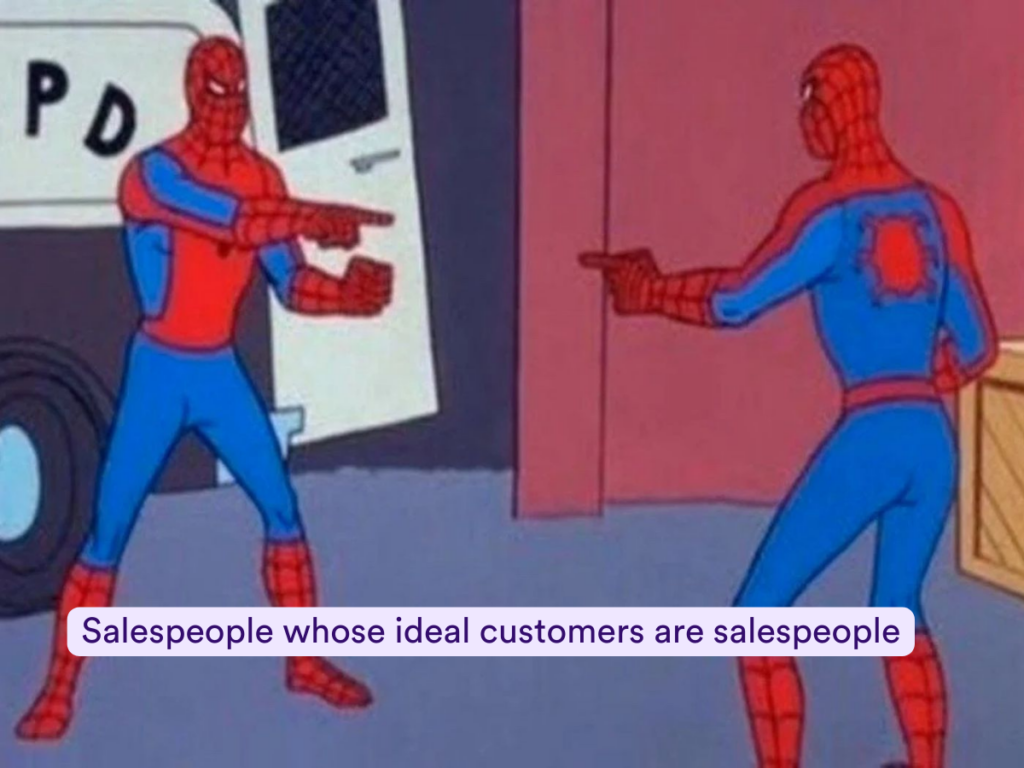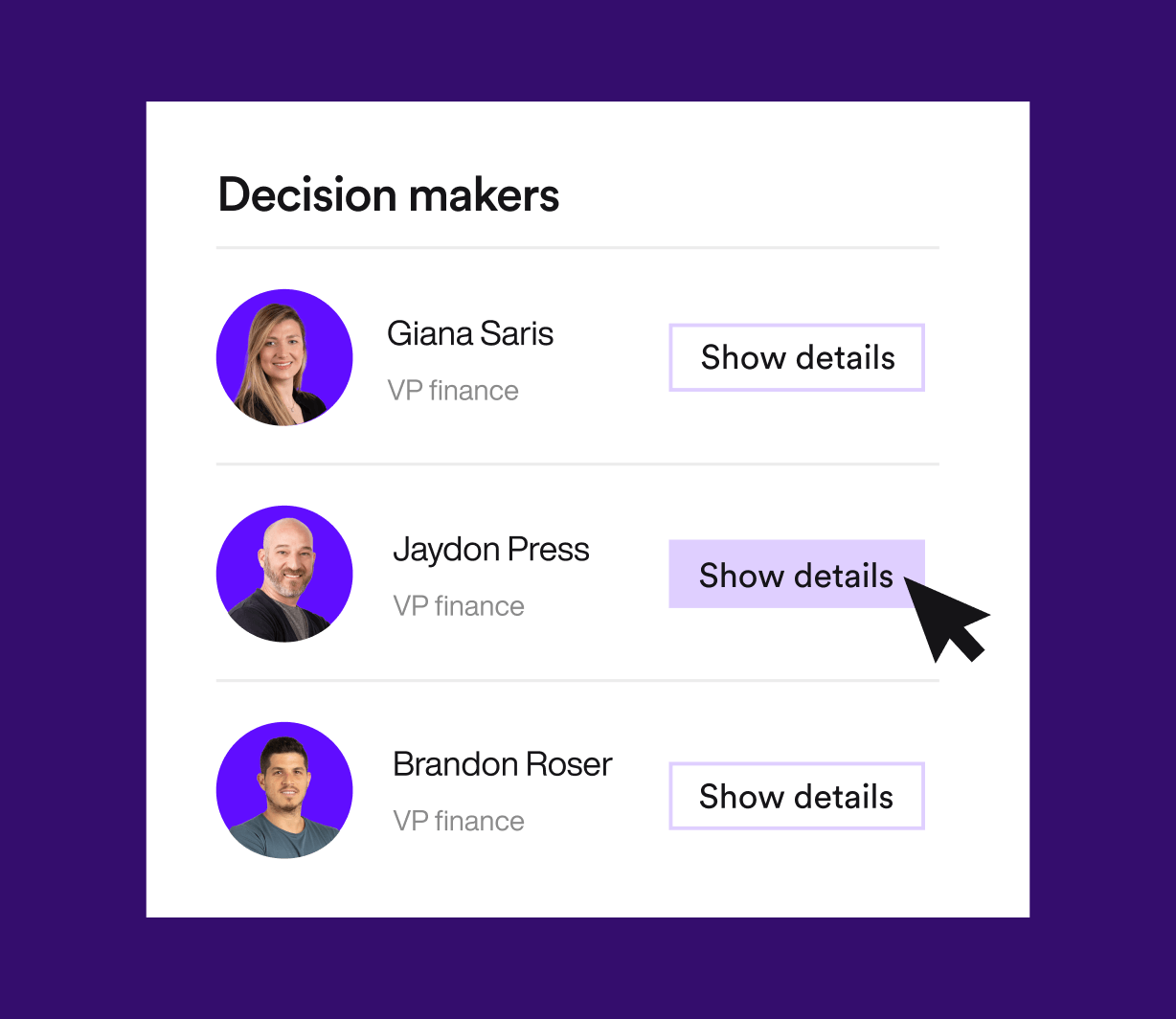Selling to salespeople just might sound like the easiest gig in the world. After all, who understands the art (and joy) of making a deal better than a fellow sales pro? But it’s not without unexpected challenges. In this post, we’ll dive into the world of selling to salespeople, exploring both the advantages and potential […]
Selling to salespeople just might sound like the easiest gig in the world. After all, who understands the art (and joy) of making a deal better than a fellow sales pro? But it’s not without unexpected challenges.
In this post, we’ll dive into the world of selling to salespeople, exploring both the advantages and potential pitfalls you might encounter – and the ways that it’s not so different from selling to anyone else. Whether you’re a seasoned sales veteran or just starting out, understanding how to navigate this specific landscape can make a big difference in your success. So let’s unpack what makes selling to salespeople both easier and harder. And most importantly, how you can nail it.
What’s easier about selling to salespeople
In some ways, selling to salespeople can be way easier than selling to anyone else.
For one thing, they know the drill – they will understand and respect the sales process more than prospects in other roles. It helps that they speak the same “language,” making your communication smoother and more efficient. And since they’re intimately familiar with how the whole thing works, they’ll likely require less hand-holding than buyers who aren’t in sales. Plus, game recognizes game: a fellow salesperson can appreciate a well-executed sales pitch, which might help build rapport.
There’s no singular “sales personality type,” but sales reps are often pretty decisive folks. Which means that once you’ve made your case and sold them on an idea, they can make decisions quickly, without excess hemming and hawing.
And lest we forget, salespeople love the sweet taste of closing a deal. Chances are, the satisfaction of a deal closed goes both ways sometimes. Especially when closing that deal with you makes their own life just that much easier.
What is harder about selling to salespeople
Before you start thinking that selling to salespeople is something you can just breeze through, it’s important to remember that there are some challenges you might face, too. Make sure to keep these challenges in mind as you embark on your sales journey with fellow sales reps.
We just said in the previous section that their familiarity with sales can make it easier to sell to salespeople. But there’s another side to that coin: because they know all the “tricks of the trade,” they’re naturally pretty skeptical of sales tactics. Salespeople have finely-tuned BS meters and they’ll quickly lose trust if they catch even a whiff of dishonesty. Of course, it’s true that any customer will jump ship if they think you’re being shady, but salespeople are way more attuned to it than the average person.
It’s also hard to get a salesperson’s time and attention in the first place. Most sales reps (especially those who would benefit from a solution that makes their job more efficient) have jam-packed calendars. It’s not just about finding a spot to squeeze into on their calendars, either. With so much sales tech saturation, you’ll really have to convince them it’s worth the imposition. And since they get pitched to all the time, good luck – pitch fatigue is real.
Finally, if you’re sending to end-user salespeople and not sales leaders, your fellow salesperson probably doesn’t have the ultimate deciding power to give a total “yes” or “no” to your product or service. It’s much more likely that they can be a great champion in your corner, but they’re not the final boss. You’ll still have someone else to convince.
So, how do you sell to salespeople?
Some things are easier, some things are harder, but what you really want to know is: how do you sell to your fellow salespeople?
The short answer is: ultimately, pretty similarly to how you sell to anyone else. The process and strategies are largely the same.
Here’s the long answer:
Do your research and use data you trust
A data-driven sales approach can increase your profits by up to 8%. When selling to salespeople (or to any other potential customer, for that matter), you want to have good data that you can rely on to find relevant decision-makers and contacts at your target accounts. That means finding a data provider you can trust that will help you find the right people at the right companies – and get you the info you need to reach out to them.
Be sure to do your research about the business, its needs, and the person you’ll be speaking to on the other end of the line. These are some basic tenets of sales no matter who your customer is, but it’s even more important to do this legwork when selling to other sellers. They have to do it too, so they’re less forgiving of others who don’t put in the time and effort to get it right.
Show them you know them
Sales at its core is about understanding your customer and offering them something that will help. Just like you’d do with any potential customer, be sure to listen well, understand their needs, and adjust your pitch accordingly (and carefully). Active listening can improve sales performance by 8%, and that’s as true when you’re selling to salespeople as it is for any other prospect.
Be honest
As we highlighted above, sales folks are super-aware of sales tactics, so honesty is the best policy. This is another aspect of selling to sellers that’s really just a general best practice in sales. Transparency in sales is the real way to build trust with your prospects.
Highlight your own sales experience
You’re talking to salespeople and telling them how they can do their jobs better with your product. You have a distinct advantage over sellers of other products with different target customers here, because you have had the same experiences as your prospects. When you’re making a sale, you’re also selling your credibility. So when you’re selling to other salespeople, lean on your own sales experience to build up your credibility.
Focus on tangible results
Sure, ROI is important, but for your average salesperson it’s a secondary factor in their consideration – it’s really more for their sales leaders or CFO to worry about. The real “return on investment” for this audience starts first with how you can help them meet their day to day goals and make their jobs easier.
Think of building your case like Maslow’s heirarchy of needs for sales: focus on the results your offering will bring them first, like better close rates and quota attainment. Once you’ve made your point there, then you can move onto slightly more intangible benefits like ROI.
Use social proof
Even the savviest salespeople are influenced by what other people say and do. The power of recommendations and social influence is crucial for selling to anyone, but especially for selling to people in a social profession like sales.
Did you know that 70% of people will trust a recommendation from a total stranger? And when it comes to recommendations from a peer, that number skyrockets to 92%. That means that social proof is your best friend. So don’t be shy about sharing case studies from respected companies or recommendations from industry influencers.
But don’t just stop there– it also pays to dive into social selling, especially on LinkedIn. Salespeople are notably active on the platform (since they’re all social selling too), so you can have more of an impact with it. In fact, LinkedIn reports that 78% of salespeople who embrace social selling outperform peers who don’t use the social approach. So share your valuable insights and establish your expertise on platforms like LinkedIn, where your fellow sales pros are likely to see it.
Key takeaways
Selling to salespeople has its unique challenges, but it can also be more straightforward than selling to other audiences thanks to common ground. Like every prospect (and maybe even a little more than the average), they’ll demand honesty, clear value, and measurable results.
With the right strategies and a solid sales process, you can navigate this space like a pro. The key? It all comes down to proving your impact and numbers. Show them how your solution makes their life easier or their results better, and you’ll have their attention. Remember, they’re in the business of selling too, so if you can show them how you’ll help them sell more, you’re golden.
And speaking of selling more, make sure you have the right tools handy to help you do that too. With Lusha, you can find your prospects quickly and easily, spending less time searching so you can do more selling. The best part: you can start for free.



